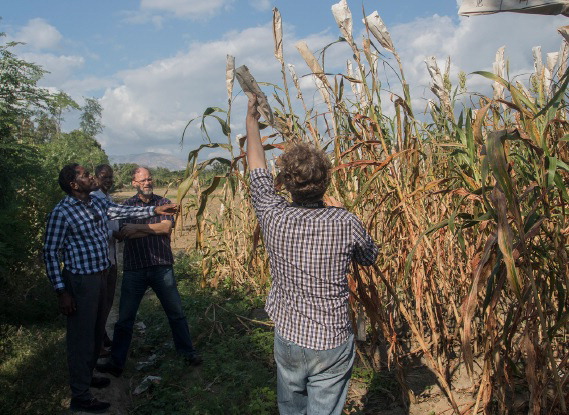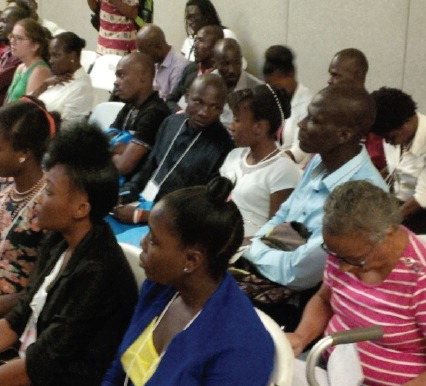|
Cycle 4 (2015 Deadline)
Exploring sustainable solutions aiming at redressing environmental disasters in Haiti
PI: Rene Jean-Jumeau (renejj2001@yahoo.com), Université Quisqueya
U.S. Partner: Jerry Bauer, USDA Forest Service, International Institute of Tropical Forestry
Project Dates: October 2015 - July 2023
Project Overview

Site visit of a biofuel crop experimentation farm by (left to right): Clifford Louimé, UPR; Dr. René Jean- Jumeau, UniQ-IHE; Dr. Gary Gervais , UPR, and Dr. Gael Pressoir, UniQ-CHIBAS) |
Since the industrial revolution, an unprecedented amount of greenhouse gases have overloaded the earth’s atmosphere, threatening large-scale disruptions in climate. When it comes to climate change, extreme weather, and health, the connections are very clear in Haiti. According to Germanwatch, for the past 20 years, Haiti has been the third most negatively impacted country in the world by global climate change. In the summer of 2008, four successive tropical storms made landfall on Haiti, leaving the country’s fourth largest city, Gonaives, inundated for months. The poorest country in the Western Hemisphere, Haiti is also prone to a variety of other natural disasters that can severely cripple such a small economy. The particular susceptibility of the landscape makes matters worse: Haiti has less than 2% of its original forest cover still standing, increasing the chances of flooding and landslides. This PEER project is aimed at developing sustainable solutions to addres some of the environmental problems, including the effects of global climate change in Haiti. Specifically, the objectives of this study are to (1) use GIS and remote sensing tools to evaluate the magnitude of deforestation and reforestation in Haiti; (2) to train Haitian students in environmental sciences at the University of Puerto Rico; and (3) to develop research projects and master’s theses in areas leading to sustainable development in Haiti, for example, reforestation and renewable energy using marine algae-based biofuels. The principal investigator and his team will partner with the University of Puerto Rico and the USDA International Institute for Tropical Forestry, which will provide mentoring and guidance, as well as access to GIS/remote sensing facilities and laboratories. This study will provide an excellent opportunity not only to train the next generation of environmental scientists in Haiti but also to continue efforts to rebuild the university system of Haiti, which was severely damaged during the earthquake of January 2010.
International organizations have concluded that unless a viable and less expensive substitute fuel is found to replace charcoal in supplying Haitian households, there will never be any slowing of deforestation in the country. In order to address this vicious cycle, the project team will develop a framework for sustainable actions to address some of the environmental ills lying at the root of the problem. First, by monitoring and evaluating deforestation and reforestation in Haiti, the team expects to better gauge remediation efforts. Second, by focusing their efforts on marine algae for use in bioenergy, they will promote clean alternatives to charcoal use while exploring clean sustainable and renewable options. Third, this initiative will contribute to the training of Haiti’s next generation of green workers for a sustainable economy, which will provide income-earning jobs to the rural poor. These objectives will be accomplished though active engagement with the community and by providing the necessary tools to key development actors in order to help them approach their pressing issues in an environmentally sustainable manner.
Final Summary of Project Activities

Participants at the workshop on "Educating for Sustainability at the CSA conference in Port-au-Prince, Haiti (photo credit: Dr. Jean-Jumeau). |
A number of outreach activities were carried out at the onset of the project. A presentation, workshop, and lecture around the project were conducted during the Caribbean Studies Association Annual Forum in June 2016. On November 10, 2018, the PEER team presented a panel at the annual meeting of the Haitian Studies Association (HSA) held at Université Quisqueya in Port-au-Prince. The panel was entitled "USAID PEER Project: Climate Change Adaptation and Mitigation in Haiti" and was chaired by René Jean-Jumeau. Professors Gervais and Jean-Jumeau made presentations at the event.
The project team pursued research on methanization (i.e. decomposition) of sargassum algae in a saline environment. Professor Gary Gervais, assisted by Haitian graduate student Jordany Fortuné, conducted experiments to analyze the digestibility of fresh and dried sargassum compared to a control system. Professor Cliford Louimé submitted four scientific manuscripts for review and publication based on this research. Additionally, an update of the assessment of the level of vegetation cover in Haiti was successfully achieved. Updated statistics on vegetation cover in Haiti were determined by a GIS technician, Mr. Constantin Joseph. The work, validated by Prof. Noël of UniQ, succeeded in characterizing and estimating wooded areas in the country, identifying and estimating forest areas, and quantifying the rate of vegetation cover of all types.
Another training element of the project was the researchers’ contributions to a new course in environmental sciences examining energy solutions to environmental problems. The research partners collaborated with Professor Viviane Julien of UniQ’s School of Agriculture and Environmental Sciences on the content of the course. Dr. Gervais also worked on the descriptions of two new courses: a biomass energy course and an environmental entrepreneurship course for undergraduate students. Laboratory spaces for the study and resolution of environmental disasters were reinforced. Support was given to UniQ’s Polyvalent Laboratory – which serves a great deal of students in various scientific fields – for collaboration with the professors involved in the PEER program, both local and international.
The program supported and supervised the fieldwork in the Parc Macaya of Haitian student Hervé Chevalier for his Master's thesis at UPR. He analyzed the effectiveness of one of the reforestation programs in the Parc Macaya and was able to fully complete his fieldwork and produce his thesis document. Two scholarships for graduate studies at UPR were also awarded to two UniQ graduates, Naldy Hans Steev Celestin and Billy Dessalines, who are currently pursuing their graduate degrees at UPR.
Publications
Steven, Singer, Clifford, Louime et al. 2022. Assessing Comparative Microbiome Performance in Plant Cell Wall Deconstruction. Microbiome 10, 183 (2022). https://doi.org/10.1186/s40168-022-01377-x
Louime et al. 2022. Circularity and Blue Economy in the Caribbean: Drivers and Business Opportunities. Journal of Waste Management World. 02/28/22 https://waste-managementworld.com/research/circularity-and-blue-economy-in-the-caribbean-drivers-and-business-opportunities/
Louime et al. 2022. Status of Higher Education in the Dominican Republic. Fulbright Assignment. Int. Journal of Education. Vol 14, No 1 (2022). https://doi.org/10.5296/ije.v14i1
Louime, C.J.; Vazquez-Sanchez, F.; Derilus, D.; Godoy-Vitorino, F. Divergent Microbiota Dynamics along the Coastal Marine Ecosystem of Puerto Rico. Microbiol. Res. 2020, 11, 45-55. https://doi.org/10.3390/microbiolres11020009
Derilus, Dieunel & Forestil, A & Fortune, Jodany & Polyanska, O & Louime, C & Gervais, G & Massey, Steven. (2019). Functional Metagenomics Characterization of an Anaerobic Saltwater Bioreactor. Journal of Renewable Energy. 2019. 1-15. 10.1155/2019/4527628. https://www.hindawi.com/journals/jre/2019/4527628/
Juliano, M. C. & Louime, C. J. (2019) Alternative Form of Clean Energy Generation: The Creation of Autonomous Units of Power Generating Biodigester Systems. International Journal of Science and Engineering Investigations (IJSEI), 8(87), 53-59. http://www.ijsei.com/papers/ijsei-88719-08.pdf
Louime, C. J., & Aguer, C. D. (2019). Metabolic Pathways Reconstruction in Cytophaga through the Exploration of Gene Expression Data Resulting from BIOLOG Substrate Utilization Patterns. International Journal of Science and Engineering Investigations. IJSEI, 8(85), 38-47. http://www.ijsei.com/papers/ijsei-88519-07.pdf
Clifford J. Louime and Lemuel Familia. 2019. Aspectos ecologicos del Parque Nacional La Gran Sabana. Acta Cientifica. 31(1-3):47-59, 2017. https://www.researchgate.net/publication/335060624_EVALUATING_THE_ECOLOGICAL_ASPECTS_OF_THE_GRAN_SABANA_NATIONAL_PARK
Clifford J. Louime, et al. 2017. Sargassum Invasion of Coastal Environments: A Growing Concern. American Journal of Environmental Sciences. Volume 13, Issue 1. Pages 58-64. https://doi.org/10.3844/ajessp.2017.58.64
Duc Tran; Louime, Clifford. 2014. Identification of Dunaliella Viridis Using ITS Markers. International Journal of Applied Science & Technology; Apr2013, Vol. 3 Issue 4, p118. https://www.ijastnet.com/journals/Vol_3_No_4_April_2013/13.pdf
Back to PEER Cycle 4 Grant Recipients
|





